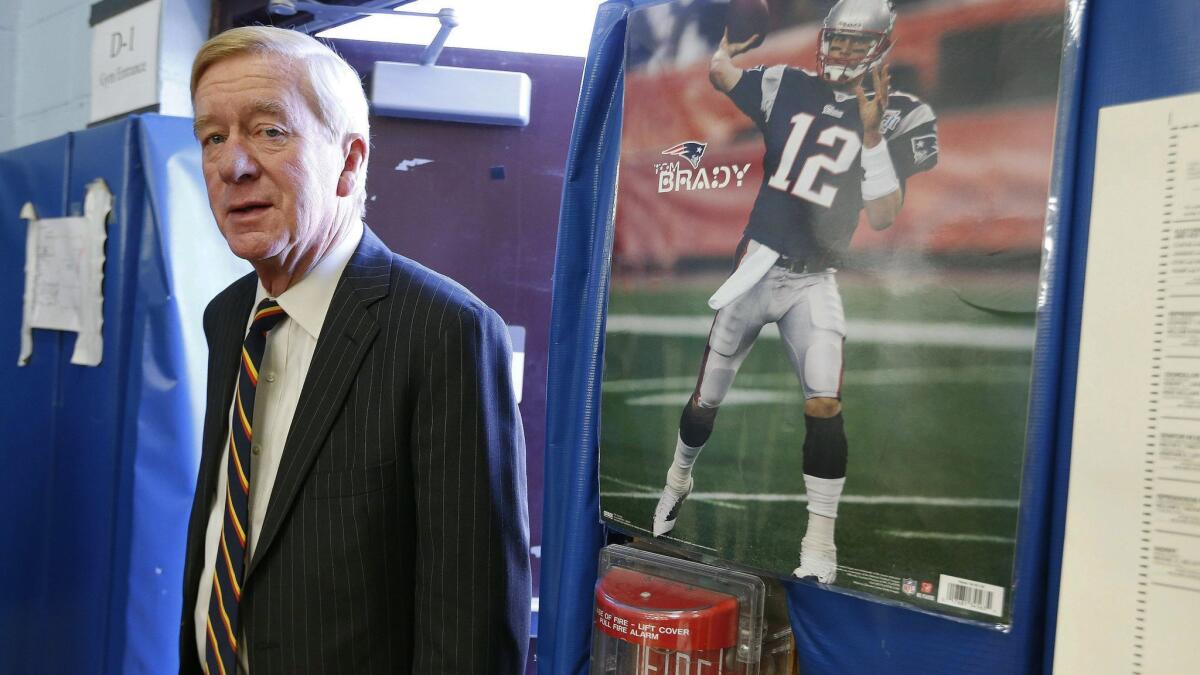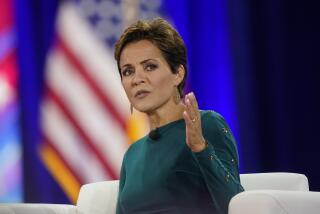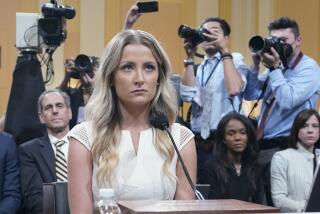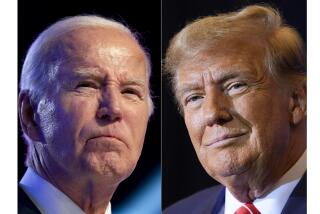Bill Weld, former Massachusetts governor, to challenge Trump for Republican presidential nomination

- Share via
Former Massachusetts Gov. Bill Weld told an audience in New Hampshire on Friday that he would try to take on President Trump in the 2020 Republican presidential primary, offering the first high-profile challenge to the president’s reelection effort.
Weld, 73, said he would seek to determine over the coming months if he could raise enough money to continue his challenge of the president. He said he would run on a traditional Republican agenda of fiscal responsibility and provide a stylistic contrast to Trump.
“It is time for all people of goodwill — and our country is filled with people of goodwill — to take a stand and plant a flag,” Weld said during a speech Friday at a Politics & Eggs breakfast in Bedford, N.H.
“In every country, there comes a time when patriotic men and women must stand up and speak out,” he said. “In our country, this is such a time.”
Weld opened his remarks in the first primary state with an unflinching denunciation of the president — “he acts like a schoolyard bully” — and Republicans in Washington who “exhibit all the symptoms of Stockholm syndrome.”
“We don’t need six more years of the antics we have seen,” he said.
Weld’s path to the nomination is difficult; Trump remains popular with Republican voters. In an interview this week, Weld noted that even if he did not succeed, a potential side benefit, from his perspective, would be weakening Trump for the general election.
Recent history has demonstrated the effect of such challenges: In 1992, President George H.W. Bush faced a troublesome challenge from the right from commentator Patrick J. Buchanan, who embarrassed the incumbent by winning 37% of the vote in the New Hampshire primary and fighting Bush until the national convention. The weakened president lost to Democrat Bill Clinton.
Similarly, President Gerald Ford had to fend off a Republican challenge from Ronald Reagan in 1976 before losing in the general election to Democrat Jimmy Carter.
Weld was elected governor of Massachusetts as a Republican twice, first in 1990. He ran his first campaign as a reformer who supported gay rights and abortion rights.
He was an erudite and quirky governor; at one news conference, held so he could sign a water-quality bill into law, he jumped into the Charles River wearing long pants and a T-shirt.
Weld was reelected in 1994 with more than 70% of the vote, despite Massachusetts’ status as an overwhelmingly Democratic state. Shortly after, he set his eyes on Washington and decided to run for the U.S. Senate, challenging John Kerry in 1996.
But Weld lost that race and, in 1997, resigned the governorship after being offered the role of ambassador to Mexico by President Bill Clinton. The nomination stalled and eventually was withdrawn due to Republican objections over his moderate positions.
He moved to New York and in 2005 announced his candidacy for governor there in the 2006 elections. But he made it only halfway through the election year before bowing out with little support.
Weld left the Republican Party in 2016 to join former New Mexico Gov. Gary Johnson on the Libertarian Party ticket. Weld received a rough welcome, winning the vice-presidential nomination on the second ballot at the party’s convention only after Johnson suggested he could not continue as the presidential nominee without him.
“The Libertarian platform is my platform, and neither of the other parties’ is,” Weld said in an interview with Slate.
On the trail, Weld described his new party as “a six-lane highway going right up the middle between the two parties.”
He made news for defending Democratic nominee Hillary Clinton over the controversy surrounding her use of a private email server. In the final days of the election, he suggested that voters in swing states cast strategic ballots to stop Trump, even if that meant supporting the Democrat.
“I’m here vouching for Mrs. Clinton, and I think it’s high time somebody did,” Weld told MSNBC’s Rachel Maddow.
After the election, Johnson announced his retirement from presidential politics, while Weld traveled the country to assess support for a Libertarian run.
“I can almost feel myself sinking more deeply into the Libertarian Party,” he told the libertarian magazine Reason in 2017. “I feel myself broadening and, as I say, even deepening politically.”
But the party lost ground in 2018, losing some state offices it had gained during the Obama presidency. Weld announced this month that he was switching back to the Republican Party.
Weld traces his roots in the country back to the 1600s when an ancestor, Joseph Weld, arrived in Boston. He graduated summa cum laude from Harvard College and earned a law degree from Harvard University.
He has five children from his first marriage, which ended in divorce. His second wife, Leslie Marshall, is a novelist and magazine writer.
Annie Linskey and David Weigel write for the Washington Post.
More to Read
Get the L.A. Times Politics newsletter
Deeply reported insights into legislation, politics and policy from Sacramento, Washington and beyond. In your inbox three times per week.
You may occasionally receive promotional content from the Los Angeles Times.










